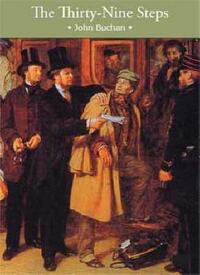Take a photo of a barcode or cover
A fun adventure story full of the close encounters and unlikely coincidences that make great fiction
“Then began an unholy row. They were all on me at once, and the policeman took me in the rear. I got in one or two good blows, for I think, with fair play, I could have licked the lot of them, but the policeman pinned me behind, and one of them got his finges on my throat.”
sorry i did laugh at this a little bit
sorry i did laugh at this a little bit
was this the most groundbreaking, thrilling novel? no. was it as bad as some people in the reviews make it out to be? also no. it was a solid three-star novel(-la?), which on my rating scale means it isn’t awful, which is good enough for me because i managed to finish it and enjoy some parts a lot. would i read it again? …no, but i’m glad i read it.
The 39 Steps is often regarded as a proto-spy-thriller and one of the founding texts of the genre. Not the first one ever, but a very early one. And now that I've finished it I can safely say that it really deserves to be hailed as an influential book.
It's not a masterpiece even by the standards of its time, but what makes it innovative is its pacing and structure. The writing is bland at times, the paragraphs long, at places a bit hard to follow. But overall the plot moves like a crazed freight train and the main focus of the story is indeed preventing intelligence from being stolen, and if that doesn't make this a very clear-cut spy novel, I have no idea what would.
The characters aren't too deep, the dialogue isn't the best, the story isn't revolutionary, but they all come together quite nicely to form a very-well paced, very well-rounded early thriller.
My quest to read the influential books of the Western thriller genre hasn't always led me to very enjoyable experiences, but I have to give it to John Buchan, I enjoyed this one. And I'm even more impressed to think that it's over 100 years old.
There are literary masterpieces that are hundreds of years old, but thrillers are relatively young compared to, say, classics, and older ones often don't read very well. This isn't one of them. Keep your expectations as low as you can and just enjoy the ride.
It's not a masterpiece even by the standards of its time, but what makes it innovative is its pacing and structure. The writing is bland at times, the paragraphs long, at places a bit hard to follow. But overall the plot moves like a crazed freight train and the main focus of the story is indeed preventing intelligence from being stolen, and if that doesn't make this a very clear-cut spy novel, I have no idea what would.
The characters aren't too deep, the dialogue isn't the best, the story isn't revolutionary, but they all come together quite nicely to form a very-well paced, very well-rounded early thriller.
My quest to read the influential books of the Western thriller genre hasn't always led me to very enjoyable experiences, but I have to give it to John Buchan, I enjoyed this one. And I'm even more impressed to think that it's over 100 years old.
There are literary masterpieces that are hundreds of years old, but thrillers are relatively young compared to, say, classics, and older ones often don't read very well. This isn't one of them. Keep your expectations as low as you can and just enjoy the ride.
I will say, one of the best things about this book is how short it is.
Okay, okay, that's not exactly right.
The first half of this book, I actually genuinely enjoyed. It's a jaunty little tale, told in that typically very early-20th century style, where there's minimal characterisation and it's more a series of humourous events happening to a gent who sort of goes along with it all because he's bored. The chapters here are short and self-contained, the sort of thing you'd expect to read in local magazines of the time.
And then it escalates... but the stakes never feel quite high. See, the problem with stories that evolve over events and not characterisation is that I never feel drawn into the narrative. How can I trust the stakes are high when it never feels that way?
I'll say this, however: part of the longevity of this book, I believe, is that it ushered in the spy genre. Though I may not enjoy this book as fully as others, I can appreciate it for that reason... even if I personally don't like spy novels.
Okay, okay, that's not exactly right.
The first half of this book, I actually genuinely enjoyed. It's a jaunty little tale, told in that typically very early-20th century style, where there's minimal characterisation and it's more a series of humourous events happening to a gent who sort of goes along with it all because he's bored. The chapters here are short and self-contained, the sort of thing you'd expect to read in local magazines of the time.
And then it escalates... but the stakes never feel quite high. See, the problem with stories that evolve over events and not characterisation is that I never feel drawn into the narrative. How can I trust the stakes are high when it never feels that way?
I'll say this, however: part of the longevity of this book, I believe, is that it ushered in the spy genre. Though I may not enjoy this book as fully as others, I can appreciate it for that reason... even if I personally don't like spy novels.
This was probably your great-grandfather's favourite book! The endless praise for the British Empire, the casual references to colonialism, and the wonderful, all knowing all powerful, massively intelligent pre-war government feature so heavily in this novel it nearly made me sick. But putting all that aside (as difficult as it is for a modern reader to do with such blatant propaganda) it was pretty exciting in places. It's a quick read, a little bit of fun, and if nothing else it enlightens you to the illusions of grandeur of the crumbling British Empire.
Patriotism always looks ridiculous when it's in a culture you don't live in. Still, a decent book.
Just what you want from a vacation read when you've accidentally only sent small print pdfs of your other books to your kindle.






